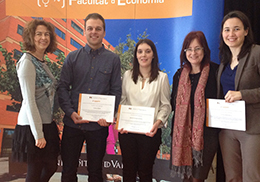
Graham White, alumne graduat del Màster Universitari en Gestió de Negocis Internacionals (iMBA) el curs passat, ha guanyat el premi anual que la Facultat d'Economia de la Universitat de València concedeix al seu millor Treball Final de Màster.
Graham won the award for his research on «Entrepreneurship Versus Non-Entrepreneurship Orientated Managers Entering Newly Liberalized Markets: The Case for U.S. Managers in Cuba». He attended the core modules of the iMBA programme at the UNCW before enrolling in the International Marketing specialisation at the UV.
Graham va aconseguir el premi per la seua recerca «Entrepreneurship Versus Senar-Entrepreneurship Orientated Managers Entering Newly Liberalized Markets: The Case for O.S. Managers in Cuba». Va fer els mòduls de base de l'iMBA en la UNCW abans de seguir l'especialització en Marketing Internacional en la UV.
Els candidats havien de: 1) Haver realitzat la seua tesi en la facultat durant el curs acadèmic 2014/15, amb matrícula (mínim 9 sobre 10); 2) Crear un poster de 100x70cm detallant el seu treball de recerca per a ser presentat i avaluat durant el Fòrum d'Ocupació i Emprenedoria 2016 (que es va desenvolupar el 17 i 18 de febrer).
El primer premi va ser un iPad Air 16GB, a més d'una beca per a assistir al XI València Summer School on Business and Economics i un xec de l'empresa Consum (patrocinadors del premi).
L'altra guanyadora del premi va ser Marina Llavador Ancheta (Màster en Política Econòmica i Economia Pública). Van ser finalistes Ilse Stefanía Lugo Cuan (Màster en Gestió de la Qualitat) i Cristina Gaona García (Màster en Marketing i Recerca de Mercats).
Est és l'abstract de la tesi de Graham:
Entering a newly liberalized market is a great challenge for companies as the environment is new and untested. In order to have success in these markets, firms must have a plan of action in place before resources are committed. What some companies do not realize is that their own entrepreneurship orientation (EO) will dictate their behavior, actions, and performance in both their home market and abroad. In order to maximize firm performance and realize success in newly liberalized markets (such as Cuba), firms must be able to objectively gauge their own entrepreneurship orientation. In this framework, the present paper will attempt to effectively measure the entrepreneurship orientation of U.S. firms that have an interest in entering the Cuban market. A final sample of 81 U.S. managers, with differing entrepreneurship orientation grades, was obtained. They were then split into two groups (high and low entrepreneurship orientation; 41 and 35 managers in each group, respectively) and compared regarding four variables: (i) entry mode, (ii) marketing strategy, (iii) government affiliation, and (iv) performance. Our results confirm that entrepreneurship orientation and firm performance do correlate positively. EO also has a positive relationship with marketing strategies that are implemented in new markets.
Keywords: Entrepreneurship orientation, innovativeness, proactiveness, risk-taking, newly liberalized market, entry mode, marketing strategy, government affiliation, and firm performance.







